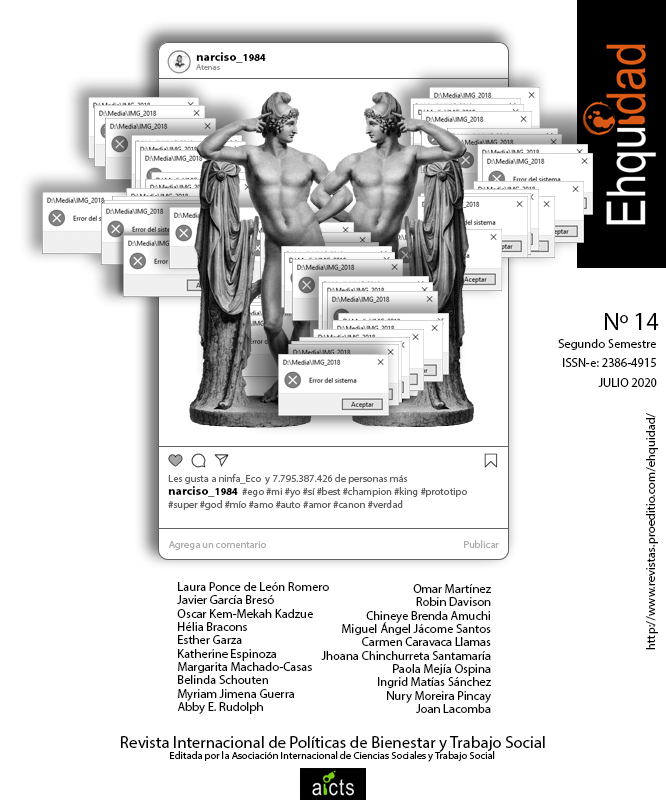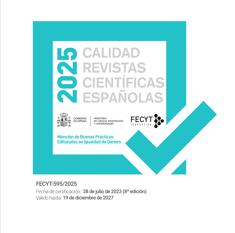ICT and Educational Inequalities in Logroño’s Schools (La Rioja, Spain)
DOI:
https://doi.org/10.15257/ehquidad.2020.0018Keywords:
ITC, inequalities, schools, training, teachers.Abstract
From an exploratory point of view, it has been analyzed whether ITC can increase educational inequalities depending on the characteristics of the schools, the training of the teachers who compose them and the social characteristics of the students of the city of Logroño. Interviews have been conducted with reference personnel in the educational sphere of the city, completing the study with telematic surveys of active teachers and staff of the Management Teams that complete 20 educational centers in Logroño, making it easier to analyze the current approximate state of the matter. The data obtained allow us to affirm that there are educational inequalities in the use and development of ITC depending on the socio-cultural contexts of the schools.
Downloads
References
Acevedo, S. (2014). Inclusión digital y educación inclusiva. Aportes para el diseño de proyectos pedagógicos con el uso de tecnologías de la comunicación. Revista de Investigaciones UNAD, 13, (1), 41-57. Doi: https://doi.org/10.22490/25391887.1130
Aguaded, I. (2013). El programa «Media» de la Comisión Europea, apoyo internacional a la educación en medios. Comunicar, 40, 7-8. Doi: https://doi.org/10.3916/C40-2013-01-01
Alguacil Gómez, J., Camacho Gutiérrez, J. y Hernández Aja, A. (2014). La vulnerabilidad urbana en España. Identificación y evolución de los barrios vulnerables. EMPIRIA. Revista de Metodología de las Ciencias Sociales, (27) ,73-94.
Area, M., Gutiérrez, A. y Vidal, F. (2012). Alfabetización digital y competencias informacionales. Barcelona, Fundación Telefónica.
Barrio de la Puente, J. L. (2009). Hacia una Educación Inclusiva para todos. Revista Complutense De Educación, 20(1), 13 - 31.
Biggs, J. (2005): Calidad del aprendizaje universitario. Ed. Narcea, Madrid.
Blanco, G. (2006). La equidad y la inclusión social: uno de los desafíos de la educación y la escuela hoy. REICE. Revista Iberoamericana sobre Calidad, Eficacia y Cambio en Educación, 4, 3.
Coley, R.J., Cradler, J.D. y Engel, P.K. (1997). Computers and classrooms: the status of technology in U.S. schools. Princeton, N.J., Educational Testing Service. Policy Information Center.
Escandell, M.O., Rodríguez Martín, A. y Cardona Hernández, G. (2004). Diversidad y Sociedad de la Información y el Conocimiento: las TIC como herramienta educativa. Anuario de Filosofía, Psicología y Sociología, 7, 95-106.
Fernández-Enguita, M. y Vázquez-Cupeiro, S. (2017). La larga y compleja marcha del clip al clic: escuela y profesorado ante el nuevo entorno digital. Barcelona, Ariel/Fundación Telefónica.
García-Ruíz, R. y Renés, P. (2013). Educación mediática en la sociedad actual. EDMETIC. Revista de Educación Mediática y TIC. 2, (2), 3-7. Doi: https://doi.org/10.21071/edmetic.v2i2.2875
Gutiérrez Martín, A. y Tyner, K. (2012). Educación para los medios, alfabetización mediática y competencia digital. Comunicar. 19, (38), 31-39. Doi: https://doi.org/10.3916/C38-2012-02-03
Miranda, R. (2007). Discapacidad y eAccesibilidad. Cuadernos/Sociedad de Información. Madrid, Fundación Orange.
Navaridas, F. (2004). Estrategias Didácticas en el aula universitaria. Logroño, Universidad de La Rioja.
ONU (2006). Convención Internacional sobre los Derechos de las Personas con Discapacidad. Nueva York, Organización Naciones Unidas (ONU)
Pérez-Escoda, A., García-Ruiz, R., Castro-Zubizarreta, A. y Aguaded, I. (2017). Media Literacy and Digital Skills for Enhancing Critical Thinking in Networked Society. In Proceedings of the 5th International Conference on Technological Ecosystems for Enhancing Multiculturality (TEEM 2017). Association for Computing Machinery, 67, 1-7. Doi: https://doi.org/10.1145/3144826.3145417
Pérez-Rodríguez, M.A. y Delgado-Ponce Á. (2012). De la competencia digital y audiovisual a la competencia mediática: dimensiones e indicadores. Comunicar, 20(39), 25-34. Doi: 10.3916/C39-2012-02-02
Purcell, K., Heaps, A., Buchanan, J. y Friedrich, L. (2013). How teachers are using technology at home and in their classrooms. Washington DC, Pew Research Center’s Internet &American Life Project
Parlamento Europeo. (2006). Recomendación del Parlamento Europeo y del Consejo de 18 de diciembre de 2006, sobre las competencias clave para el aprendizaje permanente. Bruselas (2006/962 / CE), El Parlamento Europeo y el Consejo de la Unión Europea.
Rodríguez, A. y Álvarez, E. (2017) Presentación del monográfico Educación inclusiva: avances desde la reflexión, la práctica y la investigación. Aula Abierta, 46, 5-8. DOI: https://doi.org/10.17811/rifie.46.2.2017
Santiago, R. y Sota, J.M. (2017). Informe sobre Competencias Digitales. Análisis de las Competencias Digitales. Logroño, Comunidad Autónoma de La Rioja, Gobierno de La Rioja.
Susinos, T. (2005). ¿De qué hablamos cuando hablamos de inclusión educativa? Temáticos Escuela, 13, 4-6.
UNESCO (1995). Conferencia mundial sobre necesidades educativas especiales: acceso y calidad. Salamanca, España, 7- 10 de junio 1994. Madrid, UNESCO y Ministerio de Educación y Ciencia.
Van Deursen, A.J. y Van Dijk, J.A. (2014). Digital skills: Unlocking the information society. Springer.
Warschauer, M., Knobel, M. y Stone, L. (2004). Technology and Equity in Schooling: Deconstructing the Digital Divide. Educational Policy 18, 4, 562-588. Doi: https://doi.org/10.1177/0895904804266469
Zappalá, D., Köppel, A. y Suchodoloski, M. (2011). Inclusión de TIC en escuelas para alumnos con discapacidad visual. 1ª Ed. Buenos Aires, Ministerio de Educación de la Nación.












